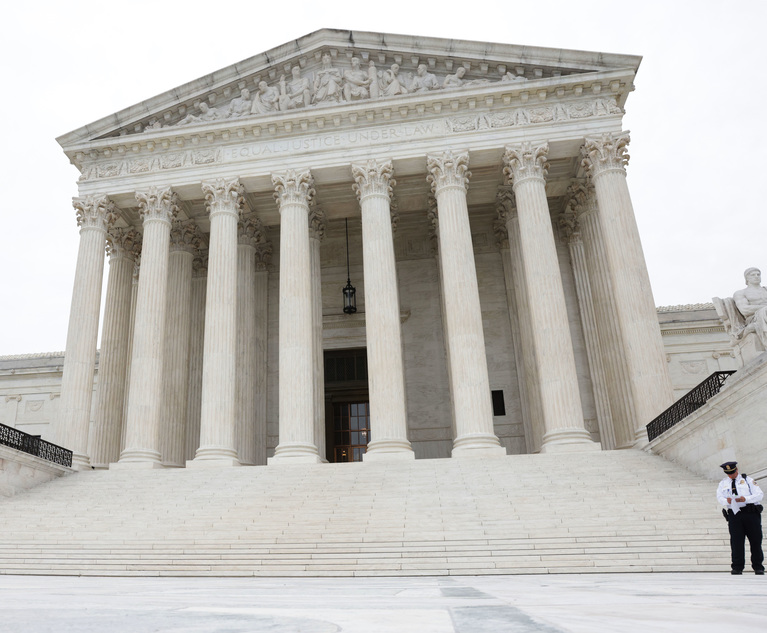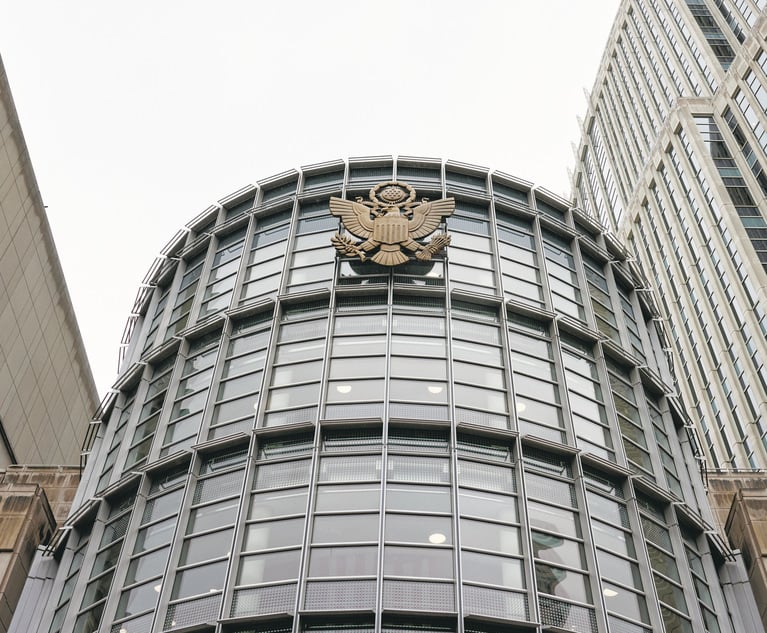 U.S. Supreme Court building in Washington, D.C. September 30, 2022. Photo: Diego M. Radzinschi/ALM
U.S. Supreme Court building in Washington, D.C. September 30, 2022. Photo: Diego M. Radzinschi/ALM Should White-Collar Defendants Be Jointly and Severally Liable for Forfeiture Judgments?
A circuit split has emerged as to whether the logic of 'Honeycutt' should be extended to benefit defendants facing joint and several liability for forfeiture in connection with fraud or other economic crimes, where the amounts in question routinely exceed tens of millions of dollars.
January 04, 2023 at 10:00 AM
10 minute read
In Honeycutt v. United States, 137 S. Ct. 1626 (2017), the U.S. Supreme Court ruled that co-conspirators convicted of federal narcotics violations could not be held jointly and severally liable for any criminal forfeiture judgment ordered in the case. Departing from years of past practice, the court held that forfeiture under the relevant drug statute instead would be limited solely to any property that a particular defendant actually acquired as a result of his or her participation in the criminal activity. At the time, many in the defense bar welcomed the ruling as a vital limitation on the government's sweeping ability to strip individual defendants of their assets without regard to their relative culpability.
This content has been archived. It is available through our partners, LexisNexis® and Bloomberg Law.
To view this content, please continue to their sites.
Not a Lexis Subscriber?
Subscribe Now
Not a Bloomberg Law Subscriber?
Subscribe Now
NOT FOR REPRINT
© 2025 ALM Global, LLC, All Rights Reserved. Request academic re-use from www.copyright.com. All other uses, submit a request to [email protected]. For more information visit Asset & Logo Licensing.
You Might Like
View All
Disbarred NY Atty Receives 54-Month Prison Sentence After $3M Embezzlement
3 minute read

Charlie Javice Jury Will Not See Her Texts About Elizabeth Holmes

'You Became a Corrupt Politician': Judge Gives Prison Time to Former Sen. Robert Menendez for Corruption Conviction
5 minute readLaw Firms Mentioned
Trending Stories
- 1'A Waste of Your Time': Practice Tips From Judges in the Oakland Federal Courthouse
- 2Judge Extends Tom Girardi's Time in Prison Medical Facility to Feb. 20
- 3Supreme Court Denies Trump's Request to Pause Pending Environmental Cases
- 4‘Blitzkrieg of Lawlessness’: Environmental Lawyers Decry EPA Spending Freeze
- 5Litera Acquires Workflow Management Provider Peppermint Technology
Who Got The Work
J. Brugh Lower of Gibbons has entered an appearance for industrial equipment supplier Devco Corporation in a pending trademark infringement lawsuit. The suit, accusing the defendant of selling knock-off Graco products, was filed Dec. 18 in New Jersey District Court by Rivkin Radler on behalf of Graco Inc. and Graco Minnesota. The case, assigned to U.S. District Judge Zahid N. Quraishi, is 3:24-cv-11294, Graco Inc. et al v. Devco Corporation.
Who Got The Work
Rebecca Maller-Stein and Kent A. Yalowitz of Arnold & Porter Kaye Scholer have entered their appearances for Hanaco Venture Capital and its executives, Lior Prosor and David Frankel, in a pending securities lawsuit. The action, filed on Dec. 24 in New York Southern District Court by Zell, Aron & Co. on behalf of Goldeneye Advisors, accuses the defendants of negligently and fraudulently managing the plaintiff's $1 million investment. The case, assigned to U.S. District Judge Vernon S. Broderick, is 1:24-cv-09918, Goldeneye Advisors, LLC v. Hanaco Venture Capital, Ltd. et al.
Who Got The Work
Attorneys from A&O Shearman has stepped in as defense counsel for Toronto-Dominion Bank and other defendants in a pending securities class action. The suit, filed Dec. 11 in New York Southern District Court by Bleichmar Fonti & Auld, accuses the defendants of concealing the bank's 'pervasive' deficiencies in regards to its compliance with the Bank Secrecy Act and the quality of its anti-money laundering controls. The case, assigned to U.S. District Judge Arun Subramanian, is 1:24-cv-09445, Gonzalez v. The Toronto-Dominion Bank et al.
Who Got The Work
Crown Castle International, a Pennsylvania company providing shared communications infrastructure, has turned to Luke D. Wolf of Gordon Rees Scully Mansukhani to fend off a pending breach-of-contract lawsuit. The court action, filed Nov. 25 in Michigan Eastern District Court by Hooper Hathaway PC on behalf of The Town Residences LLC, accuses Crown Castle of failing to transfer approximately $30,000 in utility payments from T-Mobile in breach of a roof-top lease and assignment agreement. The case, assigned to U.S. District Judge Susan K. Declercq, is 2:24-cv-13131, The Town Residences LLC v. T-Mobile US, Inc. et al.
Who Got The Work
Wilfred P. Coronato and Daniel M. Schwartz of McCarter & English have stepped in as defense counsel to Electrolux Home Products Inc. in a pending product liability lawsuit. The court action, filed Nov. 26 in New York Eastern District Court by Poulos Lopiccolo PC and Nagel Rice LLP on behalf of David Stern, alleges that the defendant's refrigerators’ drawers and shelving repeatedly break and fall apart within months after purchase. The case, assigned to U.S. District Judge Joan M. Azrack, is 2:24-cv-08204, Stern v. Electrolux Home Products, Inc.
Featured Firms
Law Offices of Gary Martin Hays & Associates, P.C.
(470) 294-1674
Law Offices of Mark E. Salomone
(857) 444-6468
Smith & Hassler
(713) 739-1250






